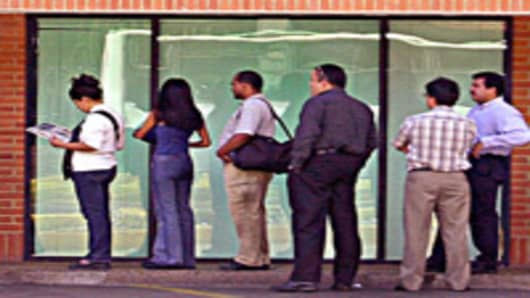The US unemployment rate could start falling later this summer, but not necessarily for the right reasons.
Economists say the Senate's rejection last week of yet another extension of jobless benefits could actually cause more people to quit looking for work, adding to the already record high numbers that have left the labor forcesince the economic downturn began in 2007.
It could also further slow the economic recovery because of the loss of income for the millions of American who have been receiving jobless benefits.
Nearly 1.1 million people were classified as "discouraged workers" in May who were not actively trying to find a job, just below the all-time high of 1.2 million in February.
The $110 billion jobs bill would have extended benefits through the Emergency Unemployment Compensation program, which has allowed some workers in the most distressed states to collect for as much as 99 weeks.
The developments contribute to on overall bleak jobless picture. This Friday's jobs report is expected to show that the US unemployment ticked up to 9.8 percent in June from 9.7 percent the previous month with a net loss of 110,000 jobs.
The actual numbers could be even worse, considering Wednesday's measure of private sector job creation came in at a disappointing 13,000, according to ADP and Macroeconomic Advisors.
"Some will leave the labor market. They'll just give up," David Resler, chief economist at Nomura Securities in New York, said in an interview.
To be sure, there's sharp disagreement on the impact that not extending jobless benefits will have. Some think it will push more people into looking for work, but Nomura believes it could add to an already-miserable sentiment among potential job seekers.
Nomura has estimated that the combination of people who will be counted as leaving the work force as their benefits expire and those taking jobs at low pay levels will bring down the 9.7 percent unemployment rate, possibly by a full point, though that won't likely show up until August or September.
The Department of Labor does not count those who have quit looking for work as unemployed in its key rate, putting them instead in a separate classification that is currently at 16.6 percent.
So while the headline number on which most people focus might get cosmetically better, there would be little underlying positive growth to support a drop in the rate.
"The labor force participation rate and the duration of unemployment are both unusually high for many subsets of the workforce," Nomura wrote in research published immediately after the jobs bill failed. "We believe that the expiration of jobless benefits will cause many workers to drop out of the labor force and will motivate others to accept jobs they had previously rejected."
About two million people will fall out of the EUC program by mid-July, according to numbers from the Department of Labor.
Nomura estimates that the result will be a $6.5 billion hit to gross domestic productfor the second quarter and another $19 billion for the third quarter. That translates into a 0.2 percent cut for the second quarter and a 0.4 percent decrease for the fourth quarter on already-anemic GDP estimates.
Kurt Karl, chief economist at Swiss Re in New York, said he has reduced his full-year GDP projection from 3.5 percent to "3 percent, perhaps a little lower" because of the lost government compensation to unemployed workers.
"It's generally considered a social courtesy to our fellow Americans for people that have been working and through no fault of their own cannot work right now," Karl said. "I'm a little disappointed in our Congress on that, and it certainly doesn't help economic activity."
Senate Democrats were unable to get 60 votes that would have ended a Republican filibuster and brought the bill for a vote.
The Obama administration touted the bill as a mini-stimulus that, in addition to extending jobs benefits, would have sent Medicaid subsidies to state governments and provided a menu of other spending programs that some Republicans derided as pork.
Congressional GOP members have been pushing the White House to follow global austerity trends as national debt has swollen to more than 60 percent of GDP. The bill could be reconsidered if political sentiment changes in Washington.
"The vote's message was probably healthy: move in with your parents and learn to take care of something other than your next tweet," Richard Hastings, macro and consumer strategist at Global Hunter Securities in Newport Beach, Calif., wrote of the bill's fate.
Hastings said initial weekly jobless claims numbersprobably will trend higher and austerity measures will limit stock market growth.
But Nicholas Colas, chief market strategist at BNY ConvergEx Group in New York, wondered whether workers forced to take jobs beneath their earning potential and less than unemployment normally pays won't learn how to game the jobs system, thus keeping the unemployment rate "elevated for years."
Colas envisions a scenario in which workers take low-paying restaurant and retail jobs long enough—normally 16 to 22 weeks—to qualify for unemployment benefits that pay more. They then will "find a way to be dismissed" so they can collect unemployment again while resuming their search for a better job.
"I don't mean to make this sound like a cynical view of the American worker. It's not," Colas said. "The unpleasant reality is that the labor market is deeply stagnant and people used to working and supporting their families will likely work the system any way they can to accomplish that goal."
Similarly, Resler said that in such difficult times it's not an easy decision on whether to give up unemployment benefits that are taxed at a very low rate or to take a lower-level job that is taxed at a significantly higher rate.
"it may well be that the labor force needs to adjust to an economy that's different in scale," he said. "The marginal tax rate on people who give up benefits can be very, very high. It may well be that it's just not worth it."



